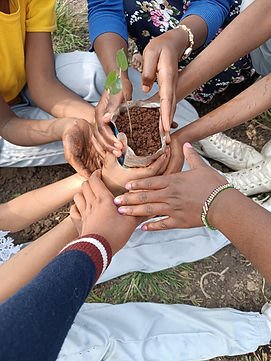Project Overview:
All rights reserved
The Greener Communities Program (GCP) is a nascent Community Based Organization (CBO) that emphasizes engaging youth in climate action initiatives. Operating within Kajiado County, Kenya, and its environs, the organization champions holistic environmental conservation and management.
Kajiado County faces significant environmental challenges, echoing the broader global climate crisis. The county has seen a concerning annual deforestation rate of approximately 2.3% [1]. Coupled with this, water scarcity has become a significant issue, with recent data revealing that only 58% of the county's residents have access to clean water [2]. This reduced access, combined with diminishing biodiversity, places further strain on indigenous communities' livelihoods, especially under the
The GRECOP Botanical Gardens Project, initiated by GCP, seeks to address these challenges. The aim is to partner with 100 schools, planting 50,000 trees which, when mature, can collectively absorb over a million kilograms of CO2 annually [3]. Beyond this quantifiable impact, the project promotes organic cultivation and emphasizes a sustainable lifestyle congruent with environmental and community benefits.
Through collaborations with schools, GCP identifies lands for botanical gardens. Indigenous community involvement ensures these gardens are ecologically and culturally harmonious. The multifunctional spaces are geared towards afforestation, organic farming, native plant conservation, and community pride.
To date, 10 schools are actively participating, and community sessions on organic farming have been initiated. The broader vision encompasses transforming livelihoods through sustainable agricultural practices, leveraging the gardens as educational platforms for the younger generation.
GCP aspires to integrate all 100 targeted schools and envisions these botanical gardens as a catalyst for similar initiatives in surrounding regions. To fully realize this, resources are required for tree and plant saplings, infrastructure, and sustainable farming tools. Collaborations will be vital, especially considering Kajiado's Arid and Semi-Arid Land (ASAL) classification.
References:
[1] Kenya Forest Service. (2020). Deforestation Rates and Trends in Kenya 2010-2020. Nairobi: KFS Publications.
[2] Water Services Regulatory Board (WASREB). (2019). Impact: A Performance Review of Kenya’s Water Services Sector 2018/19. Nairobi, Kenya.
[3] Nowak, D.J., Crane, D.E., & Stevens, J.C. (2006). Air pollution removal by urban trees and shrubs in the United States. Urban Forestry & Urban Greening, 4(3-4), 115-123.












